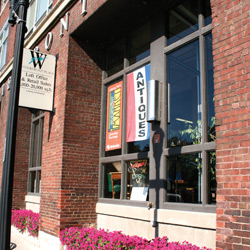
Walking down the red hallways with their contemporary fixtures, it's hard to imagine that this space was once occupied by antiques and artifacts from the last century. Some traces remain, though, most notably the worn maplewood floors that Dan Philips walks upon. As he makes his way down the corridor, he talks about the businesses that reside above him and the features that survived the building's renovation. "The goal was to keep the character of the old building, but bring it up to modern standards." Pointing at a worn metal patch on an exposed wooden column, he proclaims, "If there was a piece of tin on it 100 years ago, it's still on it today."
The building's renovated state owes a lot to Dan and his wife, Kim, who started this downtown business 23 years ago, at a time when Peoria's economy was not in the best of shape. Fortunately for them, they didn't know it-"stupid," or "naïve," they would say, depending on how you look at it. But with a lot of hard work and a little bit of luck, the Illinois Antique Center has thrived, thanks in part to a revamped building and a more inviting downtown.
Mil Town Inspiration
After marrying in 1981, the two took a trip to Milwaukee, which inspired them to develop the antique center. In that city's warehouse district, the couple came across the Milwaukee Antique Center, filled with booth after booth of antiques from a variety of dealers. As they explored the rest of the district, they found it full of art galleries, shops and restaurants. That was when they decided to bring the concept to Peoria.
And so, in 1986, the Philipses opened the Illinois Antique Center. Originally in the Murray Building, it moved to its current location on Water Street eight years later. Along with the old warehouse, which had previously housed Acme Manufacturing, the Philips purchased the neighboring buildings to the right and left. Today, they are home to the Contemporary Art Center, Simantel Marketing, the Rhythm Kitchen, and the Academy of Fretted Instruments, among others.
When the couple sought a loan to start their business, the banks failed to share their vision for the old warehouse downtown. But with help from friends and family, they were able to purchase the building, and family members have continued to help out ever since. Dan's mother and the couple's children work there part-time; his musician father plays at special events; and Kim's cousin and her brother also lend a hand.
In those days, the riverfront was far from being Peoria's cultural epicenter. With no sidewalks and poor streets, it was still very much an industrial section. Neither was the couple thinking about historical preservation. The riverfront was "available, accessible and had the attributes we were looking for," says Kim. "Good business, cool atmosphere-and we had nothing to lose."
"We still have nothing to lose!" adds Dan, jokingly.
The warehouse itself has undergone a great deal of change since the Philipses bought it. In 2003, they sold the top two floors of the building to a developer, who turned them into lofts, and they formed Waterfront Partners LLC to manage the first two floors. The couple moved all of the antique booths to the first floor and turned the second floor into commercial space for small businesses looking for a unique location.
A Riverfront Community
Along with other downtown business owners, Dan and Kim are helping to turn the Peoria Riverfront into a community. From the Illinois Blues Festival to the Riverfront Market, they are trying to create a place where people will gather and want to stay. "It's our neighborhood," says Dan. Walking by, you will see business owners outside cleaning sidewalks and watering plants, "because it's their neighborhood, too."
Years ago, not many buildings were being used in this way. Developers often failed to see their potential, only noticing the high costs of rehabbing such structures. But according to Dan, "A lot of cities have realized that the great ones are the ones that revitalize the city from the inside out. They're the ones that have a vision to take an older building and see its ability to be reborn."
The idea of rebirth and change is a constant in the Philips' store. "If you think of the 23 years we've been in business," says Kim, "it's been a journey of change for us...Often we have to re-evaluate who we are in order to stay in business."
Selling pieces on eBay is just one new addition to the Philips' ever-changing business plan, and a very successful one. And with their newly established "Redi-Room," they hope to offer Peorians an unconventional location for everything from business meetings to flea markets.
The couple is also developing a related business, Illinois Estate Services, that will assist individuals and businesses in disposing of surplus assets after portions of an estate have been left to them. In such cases, many people are unsure about what actions to take and are often taken advantage of. The Philipses can help them learn about what they have been given before making any decisions about what to sell, auction off or simply throw away.
"Ultimately, you scrape away the money part, and what we do on a day-to-day basis, and it comes down to the relationships," says Kim. "We're a family-oriented business; that's the most important thing." iBi

